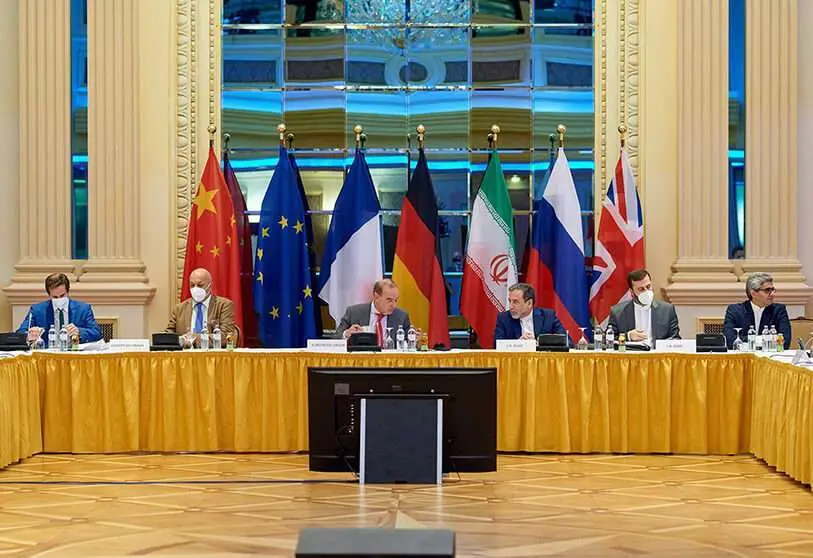Optimism at resumption of nuclear talks despite Iranian demands

After five months of waiting, just the news of the resumption of nuclear talks with Iran is a good sign. One of the unknowns surrounding this new round of talks in Vienna is the Iranian regime's position after the change in government, now headed by Ebrahim Raisi. The first signs are not as positive as possible, at least on Iran's side. However, EU representatives see this initial tough stance as a strategy to force the US to lift the sanctions imposed in recent years.

The negotiations that took place from April to June in the Austrian capital itself were not as productive as Western countries would have liked. Indeed, for the Iranian side, these talks were no more than a 'draft', with little more validity than a blank piece of paper. "Drafts are subject to negotiation. Therefore, nothing is agreed unless everything is agreed," Ali Bagheri, Iran's chief negotiator, told Iranian state television.
Weeks before resuming talks with the UK, France, Germany and China, Tehran was clear about its aspirations. They had no other intention than to end the sanctions imposed by the Trump administration. The Americans will be present in Vienna, but they will not be at the same table as the Iranians. Washington has reiterated on numerous occasions that the removal of sanctions requires a return to the Joint Comprehensive Plan of Action (JCPOA), abandoned in 2018 with Donald Trump in the White House, and to which they would be willing to return if Iran ceases uranium enrichment and respects the rules set out in the agreement signed in 2015.

It took just three years from the signing of the nuclear deal for Donald Trump to unilaterally abandon it, resulting in a systematic violation of sanctions by Tehran. There are many reasons why a return to the JCPOA that was signed in 2015 is very complicated, but there are two that are likely to make a difference in the talks taking place in Vienna.

The first is that Iran has no intention of stopping enriching and stockpiling high-purity uranium until the US removes sanctions. The now Ebrahim Raisi-led Iranians are using Washington's sudden exit from the deal as a pretext for skirting the rules agreed six years ago. And, unsurprisingly, the Biden administration will not lift sanctions until Iran stops enriching uranium, something that, in view of Tehran's initial strategy on Monday, seems almost impossible. In other words, both want the other to take the first step. Thus, there is little that can be done.
And the second reason, arguably more salient than the first, is that Iran's nuclear plan is far more advanced than it was in 2015. The JCPOA set the purity limit to which uranium could be enriched at 3.67%. Well, Iran - according to data from the International Atomic Energy Agency - has enriched uranium more than 16 times purer than allowed by the agreement, reaching 60%. Many international leaders are warning of the ever-closer risk that Iran will succeed in producing nuclear weapons - about 90 % is required to do so - another reason why the clock is ticking in favour of the Raisi regime.

The complexity of the talks with the Iranians is clearly at an all-time high, but the goal remains to reach a new agreement that guarantees nuclear security for the international community. EU diplomat Enrique Mora has said he is confident "that we can be doing important things in the coming weeks". He even claimed that the Iranians agreed to build on the six rounds of talks concluded in June and that Raisi's envoys showed "new political sensitivities". He sees it as a positive development that all the countries involved have come to Vienna and believes he can leave the Austrian capital with, if not a solid new agreement, some restrictions to constrain the Iranian regime.
However, while on the same side, the United States prefers to keep its distance and be strong in the face of Iranian demands. US State Department spokeswoman Jalina Porter disagrees with Mora's optimistic view, saying that "from the beginning, [President Joe] Biden's administration has been consistent, and we have also been sincere and steadfast in pursuing a path of diplomacy". She adds that the best option for all parties is "a mutual return to compliance with the agreement", which could "constrain Iran's nuclear programme".

This idea is not shared by its close ally Israel, which disavows any talks or agreements with the Tehran regime. Indeed, sources claim that Israeli officials are pressuring their US counterparts to take a tough negotiating line in Vienna. Israel's own defence minister, Benny Gantz, says he shared with allies that his country's intelligence believes "Iran is continuing on its path towards nuclear weapons production while violating the 2015 agreement". Israel's line does little to advance negotiations that have just resumed and whose completion is intrinsically linked to the completion of a new nuclear deal.








